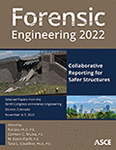CROSS Influence on Codes and Standards of Practice
Publication: Forensic Engineering 2022
ABSTRACT
The systems of codes and standards that regulate structural engineering practice in the US are complex. The Federal government cannot enforce a national building code, that authority rests with the States, and in many States, that authority is delegated to local governments. There are a multitude of private sector organizations that develop standards. There are thousands of standards that are incorporated by reference (considering direct and indirect citations) into the most commonly used model building code. There are separate model codes for highway bridges and for rail bridges, which are similarly complex. CROSS-U (Collaborative Reporting for Safer Structures), along with the CROSS efforts in other nations and regions, will find issues that justify changes in the practice of engineering and construction. Some of the necessary changes will inevitably imply changes to model codes, design standards, quality control and quality assurance processes, and certifications. Conceivably, additional layers of experts will need to be added with expertise in the many aspects of practice that could be affected, and just as importantly, who can serve as champions for the needed changes in particular standards. Models of coordinated activism exist and are recommended for review and study, to better understand successful strategies and tactics for future improvements.
Get full access to this article
View all available purchase options and get full access to this chapter.
REFERENCES
ACI (American Concrete Institute). 2019. Building Code Requirements for Structural Concrete, ACI 318-19, ACI, Farmington Hill, MI.
AISC (American Institute of Steel Construction). 2016. Specification for Structural Steel Buildings, AISC 360-16, AISC, Chicago, IL.
AISI (American Iron and Steel Institute). 2016. North American Specification for the Design of Cold-Formed Steel Structural Members, AISI S100-16, AISI, Washington, DC.
ASCE. 2017. Minimum Design Loads and Associated Criteria for Buildings and Other Structures, Standard ASCE/SEI 7-16, ASCE, Reston, VA.
ASCE. 2012. Quality in the Constructed Project: A Guide for Owners, Designers, and Constructors, Third Edition, ASCE, Reston, VA.
AWC (American Wood Council). 2015. National Design Specification for Wood Construction, NDS-2015, AWC, Leesburg, VA.
Bell, G. R. 2022. “The Decade of Disaster,” Proceedings, 9th Forensic Engineering Conference, American Society of Civil Engineers, Reston, VA.
FEMA. 2001. NEHRP Recommended Provisions for Seismic Regulations for New Buildings and Other Structures, FEMA 368, Washington, DC, (prepared by the Building Seismic Safety Council).
Herrmann, A. 2022. “Development of CROSS in the United States”, Proceedings, 9th Forensic Engineering Conference, American Society of Civil Engineers, Reston, VA.
TMS (The Masonry Society). 2016. Building Code Requirements and Specification for Masonry Structures, TMS 402/602-16, TMS, Longmont, CO.
Information & Authors
Information
Published In
History
Published online: Nov 2, 2022
Authors
Metrics & Citations
Metrics
Citations
Download citation
If you have the appropriate software installed, you can download article citation data to the citation manager of your choice. Simply select your manager software from the list below and click Download.
